
CELEHIS-Revista del Centro de Letras Hispanoamericanas
Scope & Guideline
Fostering Dialogue in Latino Literary Studies
Introduction
Aims and Scopes
- Interdisciplinary Literary Analysis:
The journal emphasizes interdisciplinary approaches to literary studies, blending literary criticism with cultural, historical, and social perspectives. This includes examining texts through lenses such as feminism, postcolonialism, and psychoanalysis. - Focus on Marginalized Voices:
A significant aim is to highlight the works of underrepresented authors, particularly women writers, indigenous perspectives, and those from marginalized communities within Latin American literature. - Exploration of Contemporary Issues:
The journal engages with contemporary themes such as trauma, memory, identity, and cultural consumption, reflecting current societal issues and their representation in literature. - Historical Contextualization:
A consistent focus is placed on the historical context of literary works, particularly in relation to significant events such as the Spanish Civil War and the military dictatorships in Latin America, which shape literary narratives. - Grotesque and Humor in Literature:
The journal frequently explores the use of humor and the grotesque in literature, examining how these elements serve to critique societal norms and express complex emotional landscapes.
Trending and Emerging
- Feminist Literary Criticism:
There is a significant increase in feminist literary criticism, exploring themes of female sexuality, identity, and the representation of women's experiences in literature, as seen in the analysis of contemporary Spanish poetry and narratives. - Trauma and Memory Studies:
Emerging themes focus on trauma and memory, particularly in the context of post-dictatorship narratives, reflecting a growing interest in how literature serves as a means of processing collective and individual trauma. - Cultural Consumption and Identity:
Recent articles emphasize the relationship between cultural consumption and identity formation, exploring how literature reflects and shapes contemporary consumer culture and personal identity. - Interdisciplinary Approaches to Literature:
There is a trend towards interdisciplinary approaches, integrating insights from fields such as sociology, psychology, and cultural studies to enrich literary analysis and broaden understanding. - Grotesque and Dark Humor as Critique:
The exploration of the grotesque and dark humor in literature is gaining prominence, with a focus on how these elements serve as tools for social critique and emotional expression.
Declining or Waning
- Traditional Literary Canon:
There appears to be a decline in articles focused on traditional literary canon and established authors, as newer publications increasingly center on contemporary voices and experimental writing. - Formalist Criticism:
Formal literary analysis, which emphasizes structure and style over context, seems to be less prevalent, as the journal leans more towards contextual and thematic explorations. - Eurocentric Perspectives:
The journal has moved away from Eurocentric literary perspectives, focusing instead on Latin American contexts and indigenous narratives, reducing the prevalence of studies centered on European literary influences. - Static Historical Narratives:
There is a noticeable decrease in articles that present static historical narratives without engaging with contemporary relevance, as the journal increasingly seeks to connect past literature with present-day issues. - Focus on Single Authors:
The trend of in-depth studies on individual authors, particularly those who are already well-established, has diminished in favor of broader thematic explorations and comparative analyses.
Similar Journals
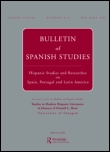
Bulletin of Spanish Studies
Fostering Insightful Conversations in Cultural StudiesBulletin of Spanish Studies is a prominent academic journal dedicated to the exploration and discourse of Spanish studies within the diverse realms of Cultural Studies and Literature and Literary Theory. Published by Routledge Journals, Taylor & Francis Ltd, this journal serves as a crucial platform for scholars, researchers, and students to disseminate their findings and engage in scholarly debates related to Spanish literature, culture, and linguistics. With an emphasis on high-quality, peer-reviewed research, the journal holds a reputable Q3 ranking in Cultural Studies and a commendable Q2 ranking in Literature and Literary Theory, reflecting its significant impact within the academic community. The Bulletin is indexed in notable databases, achieving a rank of #314 out of 1106 in Literature and Literary Theory and #738 out of 1304 in Cultural Studies, signaling its vital role in advancing knowledge in these fields. Although it does not currently offer open access options, the journal remains an essential resource for those passionate about the study of Spanish culture and literature from 2010 to 2024 and beyond.
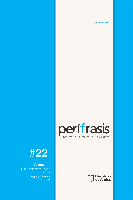
Perifrasis-Revista de Literatura Teoria y Critica
Unlocking new perspectives in literature and culture.Perifrasis-Revista de Literatura Teoria y Critica is a distinguished open-access journal published by UNIV ANDES in Colombia, dedicated to advancing the fields of literature, literary theory, and criticism. With an ISSN of 2145-8987 and an E-ISSN of 2145-9045, this journal has been a significant platform for scholarly discourse since its inception in 2010, embracing an open-access model that enhances accessibility and dissemination of research findings. Strategically positioned in the Q2 category for Literature and Literary Theory, Perifrasis boasts a commendable Scopus ranking, reflecting its commitment to high-quality scholarship. The journal encompasses a wide range of topics within the humanities, including cultural studies and gender studies, and aims to foster critical engagement and innovative thinking among researchers, students, and professionals alike. As the journal continues to evolve through its converged years from 2019 to 2024, it remains a vital resource for those exploring the dynamic intersections of literature, society, and identity.
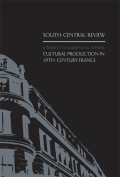
South Central Review
Cultivating Insightful Analyses of Literature and ArtsSouth Central Review, a distinguished academic journal published by Johns Hopkins University Press, serves as a vital platform for scholarly discourse in the fields of cultural studies, literature and literary theory, philosophy, and the visual and performing arts. With an ISSN of 0743-6831 and an E-ISSN of 1549-3377, this journal is dedicated to highlighting innovative research and critical analyses that explore the complexities of Southern culture and its broader implications. Although it operates without an open access option, the journal is recognized for its rigorous peer-review process and contributions to contemporary academic dialogue, holding Q3 and Q4 rankings across several disciplines as of 2023. The convergence of ideas and perspectives from diverse academic backgrounds positions the South Central Review as an essential resource for researchers, professionals, and students seeking to deepen their understanding of the cultural narratives shaping our world today.

Impossibilia-Revista Internacional de Estudios Literarios
Diving Deep into Diverse Literary LandscapesImpossibilia-Revista Internacional de Estudios Literarios is a premier open access journal dedicated to the vibrant field of literary studies, published by ASSOC CULTURAL IMPOSSIBILIA since 2011. With its ISSN 2174-2464, this international journal encourages the exploration and analysis of diverse literary theories, texts, and contexts, making it an essential resource for researchers, scholars, and students alike. Hailing from Granada, Spain, Impossibilia not only fosters academic discourse in literature but also promotes intercultural dialogue through its commitment to accessibility and inclusivity. While data such as H-index and Scopus rankings are still to be developed, the journal's focus on enriching the literary landscape ensures its growing impact and relevance within the academic community.
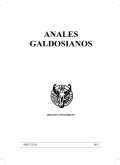
Anales Galdosianos
Challenging Perspectives on Galdós and His EraAnales Galdosianos is a prominent academic journal dedicated to the study of the works and impact of Spanish author Benito Pérez Galdós, providing a platform for innovative research in the field of Spanish literature and culture. Published by the Asoc Int Galdosistas, Inc., this journal serves as a nexus for scholars, students, and professionals interested in critical studies, literary criticism, and historical contexts surrounding Galdós's contributions to literature. Situated within the broader scope of Hispanic Studies, Anales Galdosianos enriches the academic discourse by fostering an understanding of Galdós's influence on narrative forms and social issues during his time. While the journal does not operate under open access, it remains a valuable resource for those engaged in literary research and education. With its commitment to scholarly excellence, Anales Galdosianos continues to uphold Galdós's legacy, inviting submissions that challenge perspectives and deepen our comprehension of this essential figure in Spanish literary history. For further engagement or to submit works, prospective contributors are encouraged to contact Alan E. Smith, Director of the Department of Romance Studies at Boston University.

Taller de Letras
Connecting Scholars through Literary ExplorationTaller de Letras is a renowned academic journal published by the Pontificia Universidad Católica de Chile, specifically from the Faculty of Letters. With an ISSN of 0716-0798, this journal holds a significant position in the field of Literature and Literary Theory, enjoying a commendable Q2 quartile ranking as of 2023. It operates under the auspices of a prestigious institution, promoting high-quality scholarly discourse within its scope, which spans a wide array of literary studies. Although the journal does not offer Open Access, its contributions are pivotal for researchers, professionals, and students seeking to enhance their understanding of contemporary literary trends and theories, establishing a critical dialogue within the literary community. With coverage extending through a converged lifespan from 2011 to 2024, Taller de Letras continues to be a valuable resource for those engaged in the vibrant fields of literature and criticism.

Valenciana
Fostering collaboration and creativity in academic discourse.Valenciana is an esteemed, peer-reviewed journal published by the University of Guanajuato, dedicated to advancing scholarly discourse in the fields of humanities and social sciences. Since its inception in 2008, this Open Access journal has facilitated unrestricted access to high-quality research, fostering collaboration and innovation among researchers, professionals, and students. With an ISSN of 2007-2538 and an E-ISSN of 2448-7295, Valenciana is committed to publishing original research, reviews, and theoretical contributions that illuminate contemporary issues and cultural phenomena. The journal not only serves as a platform for emerging voices in academia but also enhances its visibility in the global research landscape, driving interdisciplinary dialogue and engagement. Situated in Guanajuato, Mexico, Valenciana embraces the rich academic heritage of the region while also appealing to a broader audience, making it a vital resource for those seeking to explore new ideas and perspectives in their respective fields.

Cuadernos Lirico
Cultivating a Global Dialogue in LiteratureCuadernos Lirico is a prestigious academic journal dedicated to the exploration of literature and literary theory, published by CUADERNOS LIRICO. With an ISSN of 2263-2158 and E-ISSN 2262-8339, this journal has been committed to open access since 2011, ensuring wide dissemination of its research across the globe. Based in France, the journal serves as a vital platform for scholars and practitioners, promoting innovative discourse within its field. Despite its current position in Q4 of the Literature and Literary Theory category and a Scopus rank of #993/1106, Cuadernos Lirico aims to bolster its impact through the publication of high-quality, peer-reviewed articles that contribute to the understanding and analysis of literary texts and theories. The journal invites contributions that engage with diverse perspectives and methodologies, fostering a rich dialogue among researchers, literary critics, and educators. Join us in advancing the scholarly pursuit of literature by contributing to this dynamic platform.
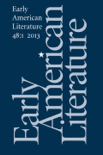
EARLY AMERICAN LITERATURE
Bridging History and Theory in Early American TextsEARLY AMERICAN LITERATURE, published by the University of North Carolina Press, stands as a pivotal journal in the field of American literary studies. With an ISSN of 0012-8163 and E-ISSN of 1534-147X, this journal invites scholarly discourse and analysis of literary works from the early American period, effectively bridging historical context and contemporary literary theory. The journal has maintained a consistent publication history since 1973, with significant converged years, providing essential insights for researchers and students alike. Ranked Q3 in Literature and Literary Theory with an impressive Scopus rank placing it in the 66th percentile, EARLY AMERICAN LITERATURE remains an essential resource for exploring the intricacies of early American texts and their implications. Although not an open-access journal, its contributions are invaluable for anyone engaging with this rich literary tradition, fostering a deeper understanding of America's cultural and literary heritage.

Literatura e Autoritarismo
Charting the Complexities of Literary ResistanceLiteratura e Autoritarismo is a leading academic journal dedicated to exploring the intricate relationships between literature and authoritarian regimes. Published by Universidade Federal de Santa Maria, this Open Access journal has been disseminating knowledge since 2003, making significant contributions to the fields of literary studies, political science, and cultural analysis. With an ISSN of 1679-849X, it serves as a vital platform for researchers and students seeking to investigate how literature responds to and shapes authoritarian contexts. The journal's commitment to accessibility ensures that its scholarly articles are freely available to a global audience, fostering diverse scholarly dialogue. Positioned in a critical niche, Literatura e Autoritarismo is dedicated to advancing understanding of how literary discourse can illuminate the complexities of power, resistance, and identity under oppressive regimes, making it an essential resource for those engaged in this vital area of study.